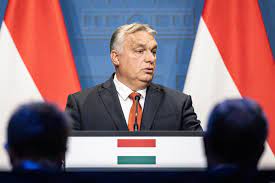Putting Orbán in charge of Europe is a terrible idea

Brussels: In less than six months, Hungary will take over the rotating EU Council presidency. Yes, you read that right. Starting on 1 July, Hungarian Prime Minister Viktor Orbán will be at the helm of the European Union for six months.
The man who turned Hungary into an autocracy, introduced the concept of an ‘illiberal’ democracy to European politics and turned Hungary into a mafia state. Orbán, the man whose ministers have shaken the hands of Kremlin representatives more often than any other EU government and who excessively abuses his veto on the European level in order to extort EU money. This individual will be in charge of setting the EU agenda in the weeks after the EU election when top jobs are distributed, the five-year work plan for the Commission is being decided, and when, not least, Donald Trump will campaign for a second turn.
These are dire prospects for Europe. But they are not set in stone. The Orbán problem can be dealt with politically, which is something the European Parliament has already asked member states to do. As early as June 2022, a resolution was passed that questioned ‘how Hungary will be able to credibly’ assume the Council’s presidency. Members of the European Parliament tasked the Council to ‘find a proper solution as soon as possible’.
Since then, exactly nothing has happened on the matter. As the Commission detailed in reply to my written question from last September, ‘several meetings have already been held between the Commission and representatives of the Hungarian government’ in order to prepare for that very presidency. The aim of these meetings, according to the Commission: to ‘advance the EU agenda and facilitate the work of the EU institutions with regard to legislative and non-legislative dossiers.’ Hence, even though the European Parliament repeatedly expressed its reservations about the Hungarian presidency, Orbán is already shaping the EU agenda for this year.
It has been argued that the risks of a Hungarian presidency are limited. With the European elections just three weeks before, little to zero legislation would be negotiated between the European Parliament, the EU Commission and the Council, leaving not too many chances for Orbán and his government to actually leave his footprint on EU laws. But this line of argument is flawed. The Orbán presidency poses a serious risk to European democracy because it is happening at a time when the agenda of the whole European Union is shaped for the next five years. Orbán’s ministers would chair the very meetings where the course is set for Europe’s future.
Furthermore – and just as worrying: the US elections will take place during the Hungarian Council presidency. Orbán has made clear time and again that he supports his authoritarian brother in spirit, Donald Trump. And his government has accused the Biden administration of illegitimately meddling in the US elections. So, what if Trump attempts another coup d’état? What would a European response look like if Orbán had a decisive say in it? How could Europe stand united if Council meetings are being chaired by the friends of outspoken enemies of the European Union, Vladimir Putin and Donald Trump?
The preferred modus operandi of many EU governments in EU politics is to postpone, ignore or play down the most pressing policy issues if there’s no consensus. But this will not work with Orbán
The autocratic rule of Viktor Orbán in Hungary and his veto in the Council pose a serious security risk for European citizens. And if the European Union does not take action before July, we are bound to give him even more power. There is too much at stake to just hope that everything will end up just fine. Preconditions have to be put in place that would bar an authoritarian Orbán government from taking over the helm of the European Union. And these preconditions don’t have to be political ones.
Currently, the Orbán government is subject to two sanction procedures due to systemic rule of law violations: an Article 7 procedure that could eventually lead to a withdrawal of voting rights and the rule of law conditionality, which already led to the freezing of more than €6bn of EU funds. EU governments could easily argue that a member state dealing with not just one but two rule of law procedures is unfit to take over the rotating Council presidency. The order of member states could be changed with a qualified majority vote. The presidency would not be taken away from Orbán as a punitive measure. Hungary would simply be put in a holding pattern — until democracy and the rule of law would be functioning again in the country.
The preferred modus operandi of many (if not all) EU governments in EU politics is to postpone, ignore or play down the most pressing policy issues if there’s no consensus. Especially when member states fear a measure might one day be used against them as well, it is tempting to just kick the can down the road. But this will not work with Orbán.
At the European Council summit last December, the prime minister demonstrated that he has perfected the art of abusing his European power. He managed to extort €10 bn of EU funds and still holds a handful of vetoes. The lesson is clear: if you give Viktor Orbán power, he will abuse it. He will use it to the detriment of the European Union. It is time to finally put an end to it.





